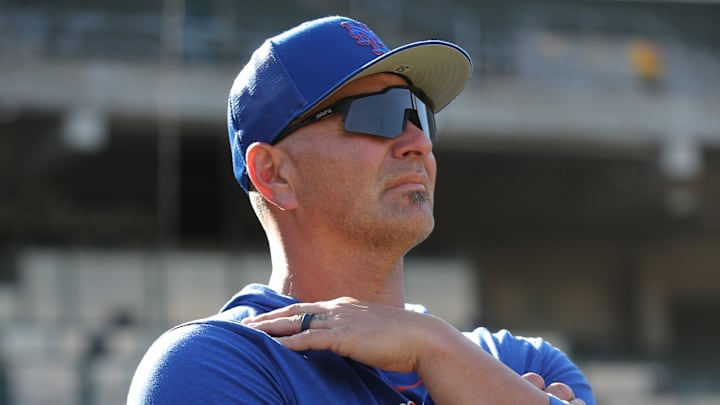There’s a certain art to hindsight, especially in baseball, where everyone’s an expert once the dust settles and the season’s gone. The New York Mets have given plenty of former coaches time to reflect, and Eric Chavez recently took his turn at the mic, sharing his thoughts on what went right, what went wrong, and what still makes this team tick beneath all the noise.
Most of what he said landed like a sweet line drive to center—measured, honest, even a little reassuring. But then came one thought that, had it ever been acted on, might’ve thrown the balance of something that didn’t need fixing. Sometimes the best coaching decision isn’t a new approach or a clever adjustment. It’s knowing when to leave greatness alone.
Eric Chavez offered solid Mets insights, but one early-count adjustment about Juan Soto stood out
Among the reflections Chavez shared on the Mets, one idea immediately stands out. He said he briefly considered whether Soto might benefit from being more aggressive early in the count or on the first pitch, and he mentioned the thought to Mendoza. He quickly went into why it wouldn’t be a good idea to take a player like Soto out of his comfort zone. Soto is a precision hitter, a player who thrives by working counts and finding the perfect pitch. Disrupting that rhythm would risk interfering with a rare skill set.
Eric Chavez said he got with Carlos Mendoza a few times this season about trying to get Juan Soto to be more aggressive early in counts and on the first pitch of his at-bats.
— Foul Territory (@FoulTerritoryTV) October 9, 2025
Chavez also suggests batting Juan Soto leadoff if the Mets really want to get creative. pic.twitter.com/DxIiYvWkk9
The idea itself reveals why it didn’t take off. Soto’s discipline, pitch recognition, and ability to control at-bats are precisely what make him one of the top hitters in the game. Interfering with that comfort zone could have done more harm than good. Even Chavez is a believer in letting Soto operate naturally—he said in the interview that both the Mets and Soto might benefit from having him bat leadoff, using his discipline to set the table for the lineup.
Beyond Soto, Chavez offered broader reflections on the team. He praised the clubhouse, noting the players pulled for one another, and he expressed confidence in Alvarez, saying the catcher has the tools to develop into a strong offensive presence. He also acknowledged the realities of coaching in a high-pressure, big-market environment, understanding why staff turnover happens even when no one truly “deserves” to be fired.
"The coaching staff was steadfast. I'll go to bat for these guys any day."
— Foul Territory (@FoulTerritoryTV) October 9, 2025
Eric Chavez doesn't believe anyone on the Mets coaching staff should've been fired. pic.twitter.com/JduRr3xIlO
In the end, the Soto thought remains the single idea that didn’t pan out—a brief consideration that never became action. Yet it highlights a key lesson about coaching: even experienced minds sometimes flirt with changes that hindsight shows weren’t necessary. And in this case, leaving a talent like Soto alone speaks louder than any adjustment ever could.
